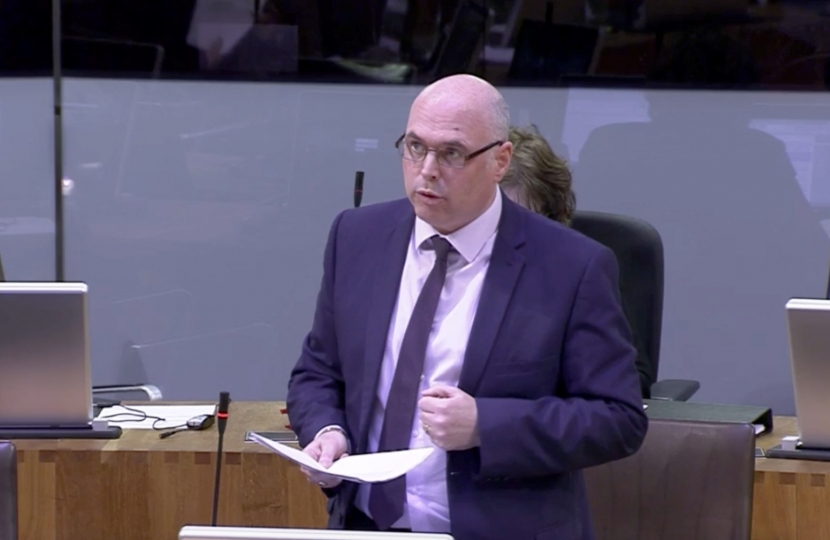
For the English text scroll down.
Paul Davies AS: Byddwn yn “chwyldroi’r mynediad at ein hanes a'n diwylliant – ac ym mhob rhan o Gymru”
Ar safle’r blog Gwydir heddiw, (https://gwydir.blog/2020/08/07/pam-bod-rhaid-i-ni-amddiffyn-a-hyrwyddo-beth-maen-golygu-i-fod-yn-gymreig/) mae Arweinydd yr Wrthblaid yn Senedd Cymru, Paul Davies AS, yn esbonio sut fyddai Llywodraeth Geidwadol Cymreig yn “chwyldroi’r mynediad at ein hanes a'n diwylliant”, yn ystod wythnos pan fyddai pobl yn ymgynnull fel arfer ar gyfer yr Eisteddfod Genedlaethol, a chyfarfod â ffrindiau o bob rhan o Gymru.
Yn yr erthygl, mae Paul yn edrych tua'r dyfodol ac yn cyhoeddi pum addewid y byddai Llywodraeth Geidwadol Cymreig yn eu rhoi ar waith ar gyfer Cymru gyfan i wella’r mynediad at ein hanes a'n diwylliant, yn cynnwys Oriel Gelf Genedlaethol gyda chasgliadau yng Ngogledd a De Cymru, Amgueddfa Filwrol Genedlaethol a leolir yn Aberhonddu gydag arddangosfeydd ledled Cymru, Arsyllfa Genedlaethol, arddangosfa barhaol gan y Llyfrgell Genedlaethol yng Nghaerdydd ynghyd ag Aberystwyth a safle gwell i'r Archifau Cenedlaethol yng Nghymru.
Fel siaradwr Cymraeg iaith gyntaf, mae erthygl Paul yn archwilio beth mae hunaniaeth yn ei olygu yn y Gymru fodern, gan fyfyrio ar y gorffennol, y presennol a'r dyfodol, ac ystyried sut mae'r Ceidwadwyr Cymreig wedi chwarae rhan hanfodol yn hyrwyddo diwylliant Cymru. Ysgrifennodd Paul:
“Er bod ein gwrthwynebwyr yn ei chael hi’n anodd cydnabod hynny, mae’r sefydliadau sy’n benodol i Gymru wedi ffynnu'n aml am fod llywodraethau Ceidwadol wedi eu gyrru yn eu blaen.”
Mae'n mynd yn ei flaen i ddweud: "mae llawer ohonom yn cofio sefydlu S4C, corffori'r Gymraeg yn y cwricwlwm, a chreu Bwrdd yr Iaith Gymraeg yn glir. Gwaith y Blaid Geidwadol oedd hyn oll, ac mae'n rhaid cydnabod, gwaith Syr Wyn Roberts yn benodol. A lwyddodd unrhyw wleidydd Cymreig erioed i gyflawni mwy dros hunaniaeth a diwylliant Cymru na Syr Wyn? Ond unwaith eto, mae gormod o sylwebwyr a haneswyr yn obsesu ynghylch refferenda datganoli ac yn anwybyddu popeth nad yw'n gweddu i’w naratif."
Yn fwy diweddar, mae Paul yn ystyried effaith arweinyddiaeth Nick Bourne ar Blaid Geidwadol Cymru a llwyddiant y cyn Ysgrifennydd Gwladol, Cheryl Gillan, a oruchwyliodd y bleidlais i estyn pwerau Cynulliad Cymru yn 2011 ac a gychwynnodd y broses a elwid y Comisiwn Silk, a roddodd bwerau codi trethi ac amrywio trethi i Lywodraeth Cymru am y tro cyntaf ers 800 mlynedd.
Fodd bynnag, mae Paul yn mynegi ei bryderon ynglŷn â sut, “fel Ceidwadwyr, rydym wedi methu esbonio beth a wnaethom a pham y'i gwnaethom yn rhy aml o lawer. Rydym wedi derbyn cael ein hysgubo i gyrion hanes oherwydd, mewn gwirionedd, mae cydnabod bod y Ceidwadwyr Cymreig yn bodoli hyd yn oed yn wrthun i lawer o bobl”
Mae Paul yn gorffen trwy ysgrifennu:
“Fel Ceidwadwyr Cymreig byddwn nid yn unig yn gwarchod – byddwn yn diogelu, byddwn yn gwerthfawrogi, a byddwn yn hybu hanes Cymru, y Gymraeg, a diwylliant Cymru.”
Paul Davies MS: We will “revolutionise access to our history and culture – and in every part of Wales”
Writing on the Gwydir blog site today, (https://gwydir.blog/2020/08/07/why-we-need-to-protect-and-promote-what-it-means-to-be-welsh-2/) the Leader of the Opposition in the Welsh Parliament, Paul Davies MS, has explored how a Welsh Conservative Government would “revolutionise access to our history and our culture”, during a week where people would normally have been gathering for the National Eisteddfod, meeting up with friends from across Wales.
In the article, Paul looks towards the future and announces five pledges for a Welsh Conservative Government to implement for the whole of Wales to improve access to our history and culture, including a National Art Gallery with collections in North and South Wales, a national Military Museum based in Brecon with exhibitions throughout Wales, a National Observatory, a permanent National Library exhibition in Cardiff as well as Aberystwyth and a greater place for the National Archives in Wales.
As a first language Welsh speaker, in the article Paul explores what identity means in a modern Wales, reflecting on what the past, present and the future holds, looking at how Welsh Conservatives have been fundamental in the promotion of Welsh culture. Paul writes:
“As uncomfortable as it may be for our opponents to acknowledge it, Wales-only institutions have often thrived when driven forward by Conservative governments”.
He continues: “many of us will clearly remember the establishment of S4C, the enshrining of the Welsh Language in the curriculum, and the creation of the Welsh Language Board. All the work of the Conservative Party and, it must be acknowledged, the work in particular of Sir Wyn Roberts. Has there ever been a Welsh politician who has achieved more for Welsh identity and culture than Sir Wyn? But yet again too many commentators and historians obsess about devolution referendums and disregard everything that does not suit their narrative."
More recently, Paul examines the impact of the leadership of Nick Bourne on the Welsh Conservative Party and the success of the former Secretary of State Cheryl Gillan who oversaw the vote to extend the Welsh Parliament’s powers in 2011 and also began the process known as the Silk Commission, giving the Welsh Government tax raising and tax varying powers for the first time in 800 years.
However, Paul raises his concerns about how “as Conservatives we have far too often failed to explain what we did and why we did it. We have been too content to be pushed to the side-lines of history because, quite frankly, it doesn’t suit lots of people to acknowledge we Welsh Conservatives even exist.”
Paul concludes by writing:
“As Welsh Conservatives we will not only conserve, we will protect, we will prize, and we will promote Welsh history, the Welsh language, and Welsh culture.”



